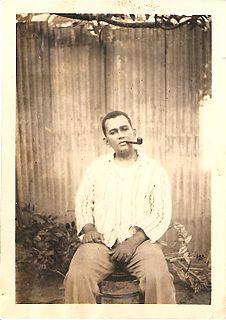James Isaac Alexander Manswell (2 June 1927 – 18 September 2006), was born in Brighton La Brea, Trinidad and Tobago. He briefly entered the teaching profession in 1945 before joining the Civil Service on 14 July 1946 as a 2nd Class Clerk at the Port of Spain Magistracy. In 1950 he was elected Secretary of the Staff Side of the Magistracy Division of the Civil Service and followed that in 1955 by being elected to the Executive of the Civil Service Association [1] (CSA) representing the Eastern Counties.

La Brea is a town in southwestern Trinidad, located northeast of Point Fortin and southwest of San Fernando. La Brea . is best known as the site of the Pitch Lake, a natural asphalt lake. Pronunciation of "La Brea" differs from that used in the USA at the La Brea Tar Pits in Los Angeles. Trinidadians call this place "La Bray."

Trinidad and Tobago, officially the Republic of Trinidad and Tobago, is a twin island country that is the southernmost nation of the West Indies in the Caribbean. It is situated 130 kilometres south of Grenada off the northern edge of the South American mainland, 11 kilometres off the coast of northeastern Venezuela. It shares maritime boundaries with Barbados to the northeast, Grenada to the northwest, Guyana to the southeast, and Venezuela to the south and west.

Port of Spain, officially the City of Port of Spain, is the capital city of Trinidad and Tobago and the country's second-largest city after San Fernando and the third largest municipality after Chaguanas and San Fernando. The city has a municipal population of 37,074, an urban population of 81,142 and a transient daily population of 250,000. It is located on the Gulf of Paria, on the northwest coast of the island of Trinidad and is part of a larger conurbation stretching from Chaguaramas in the west to Arima in the east with an estimated population of 600,000.
He became the Assistant Secretary of the CSA in 1960 at a time when Hugh Harris was the President and O. E. Morle the Secretary. The CSA appointed Manswell as it first full-time General Secretary in 1961.
In addition to his work for the CSA, he was also General Secretary of the Trinidad and Tobago Labour Congress and later its President. He was part of the workers delegation to the International Labour Conference of the International Labour Organization representing the Labour Congress in 1978 and on fourteen subsequent occasions. He was nominated by the Labour Congress to a number of State Boards including the T&T Mortgage Finance Company and the Investment Committee of the National Insurance Board.

The International Labour Organization (ILO) is a United Nations agency whose mandate is to advance social justice and promote decent work by setting international labour standards. It was the first specialised agency of the UN.The ILO has 187 member states: 186 of the 193 UN member states plus the Cook Islands(South Pacific) are members of the ILO. The tripartite structure is unique to the ILO where representatives from the government, employers and employees openly debate and create labour standards.
In 1962 Manswell was one of the members of Prime Minister Eric Williams delegation to the Commonwealth Prime Ministers Conference as the nominee of the Labour Congress.

Eric Eustace Williams served as the first Prime Minister of Trinidad and Tobago. He served as prime minister from 1962 until his death in 1981. He was also a noted Caribbean historian.
The continued development of the CSA saw the organisation purchasing properties in Port of Spain, including the current Head Office in Abercromby Street, [2] Port of Spain, in 1965.
On being given a leave of absence from the Union in 1968, he successfully gained a Diploma of Social Studies at Oxford University and went on to complete the first year examination of the LLB Law Degree. His studies were interrupted by the death of the Union's President, Milton Adams, and in 1970 he returned to Trinidad and Tobago and his post in the Union.
He was instrumental in the formation of the Caribbean Public Services Association, of which he became the General Secretary in August 1970 – a position he held until his retirement from the Union in 1981.
He was directly responsible for the formation of the Public Service Credit Union which survives to this day.
Sir Ellis Clarke, then the President of the Republic of Trinidad and Tobago, appointed Manswell as an Independent Senator in 1976 and he remained in the Senate until his retirement from the Union.
He retired from the Public Services Association (the successor to the CSA) in 1981 having reached the position of First Executive President. However, he became a consultant to the Union in 1997 representing them in a matter in the Industrial Court as late as 2006.


